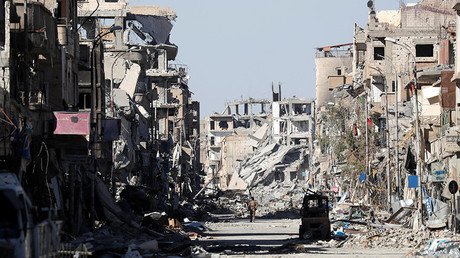Russia says ISIS controls less than 5% of Syria as rights groups raise alarm over Raqqa
The area controlled by Islamic State in Syria has been reduced to less than 5 percent, the Russian Defense Ministry said, but human rights groups remain concerned about the “dire humanitarian situation” in Raqqa, captured from jihadists by US-backed militias.
“Islamic State [IS, formerly ISIS/ISIL] currently controls less than 5 percent of Syrian territory,” Russian Defense Minister Sergey Shoigu said on Tuesday, noting that prior to the Russian Air Force operation, IS controlled “more than 70 percent of Syrian territory.”
According to Shoigu, over the course of two years, the Russian Air Force has helped to destroy nearly 1,000 terrorist training camps, almost 700 factories and munitions manufacturing workshops, and 1,500 units of military equipment belonging to terrorists.
“Some 998 cities and settlements have been liberated from terrorists,” Shoigu noted, adding that Russian de-mining experts neutralize as many as 1,500 explosive objects per day left by IS militants in Syria.
However, in some of the territories liberated from Islamic State life remains a struggle. Human rights groups say they are seriously concerned about the situation in Raqqa, which had served as IS’ Syrian stronghold since January 2014, and was seized by the US-backed Syrian Democratic Forces last week.
Most residential buildings in the city are believed to have been rendered uninhabitable due to the fighting and the massive bombardment by the US-led coalition’s airstrikes and artillery shelling. Human Rights Watch (HRW) told RT that Washington apparently neglected the city’s infrastructure while prioritizing the defeat of IS at all costs.
“ISIS has done a lot of harm not only to the inhabitants but also to the social fabric of the city. It has emptied it of doctors, nurses, teachers and all things that are badly needed by the population,” Ahmed Benchemsi, of Human Rights Watch, told RT. “Add to this that the US-led coalition has waged a bombing campaign that has prioritized defeating ISIS over the need to protect the city’s infrastructure.”
“So, now the lingering questions are: who will get the hospitals running? Who will rebuild them? Pay doctors? Maintain equipment? Who will rebuild schools, roads and all that has been destroyed? It appears that there are little to no plans for reconstruction, and that is a major concern for us,” he added.
The Russian Defense Ministry likened the destruction caused to Raqqa to the infamous Allied bombing of Dresden in 1945.“Raqqa’s fate calls to mind that of Dresden in 1945, levelled by the US-British bombings,” Defense Ministry spokesman Gen. Igor Konashenkov said on Sunday, adding that the US-led coalition may be rushing to pour money into the Syrian city to cover up the aftermath.
#Raqqa libérée est à 80% détruite. Une ville fantôme où tout est figé. L’enfer sur terre. pic.twitter.com/8uVFGOsp7w
— Arnaud Comte (@arnaudcomte) 22 октября 2017 г.
France 2 reporter Arnaud Comte said that some 80 percent of Raqqa has been destroyed: "[It’s] a ghost town where everything is frozen. Hell on earth,” he wrote on Twitter, posting heart-wrenching images of the wrecked city.
A UN Refugee Agency spokesman has described the situation in Raqqa as grave. “The United Nations stands ready to assess people with humanitarian assistance in Raqqa and its surroundings, however, at the moment we have no access and therefore no humanitarian convoys or assistance can reach Raqqa city. The humanitarian situation is dire, there is no sufficient water or health clinics and it’s not safe as many unexploded remnants of this war still remain. So that needs to be cleaned up first before any civilian can go back,” Firas al-Khateeb, UNHCR spokesman in Syria, told RT.
Pre-war, the city had some 220,000 residents. The violence in Syria caused mass migration, with tens of thousands arriving in Raqqa throughout the years, but under IS rule the city’s Kurdish minority was targeted with evictions and executions. Up to 200,000 people were estimated to still be living there at the beginning of the siege in June.













